Style
9 Effective Treatments To Get Rid Of Hormonal Acne And Prevent Painful Breakouts

If you suffer from hormonal acne, just leaving the house can feel like a challenge. We live in a time where skin acceptance is more widely discussed, but even then, showing off red painful blemishes isn't my ideal way to start the day. In fact, many acne sufferers spend hours asking Google, "How to cure hormonal acne" Unfortunately, there isn't a miracle overnight fix, however, there are treatments that really do work.
But first, the basics — what causes hormonal acne? Well, unlike other types of breakouts, this kind is triggered by fluctuations in oestrogen and progesterone, reports Health Line. The ratio of these hormones, together with levels of testosterone, and even stress, can result in painful cysts that are often hard to get rid of. According to skin expert Dr Terry Loong, menstrual cycles can have a detrimental effect on skin too, causing red lumps to pop up on cheeks and around the jawline. While most people will have dealt with the odd acne flare-up as a teenager, it's not uncommon for the condition to rear its head well into adulthood. In fact, a recent study published in the Journal of Clinical and Aesthetic Dermatology found that 50 percent of women aged 20 to 29 reported having acne. So don't worry, you're really not on your own with this one.
If you are a current sufferer of hormonal acne, your first thought will probably be to shell out tonnes of money on "wonder" products, turning your three-step skincare routine into an hour-long ordeal. But the key to treating hormonal acne, according to experts, is to simplify your skincare routine and only use products that will actually help. These can include anything from prescription-strength medication to oral contraceptives and acid-filled cleansers. As June is Acne Awareness Month, it seems an apt time to lay out exactly which treatments you should be trying out to beat those spots once and for all.
1Roaccutane
Available on prescription
Roaccutane, also known as isotretinoin, is one of the most common tablets prescribed for hormonal acne. It's an oral retinoid so can do everything from reducing sebum and bacteria to stopping pores from clogging and eliminating redness on the skin. Unfortunately, its benefits come with a number of side effects with dryness being the most common. If you're put on a course of Roaccutane, the NHS recommends wearing sunscreen daily and using contraception as it is "likely to harm a baby."
2Spironolactone
Available on prescription
These prescription tablets are available via your GP. Originally intended to treat high blood pressure, experts found that spironolactone was also an effective acne remedy. "An appropriate dose, can help with these cystic flares, in particular the ones that women develop with their hormonal changes during the month,” Dr. Shari Marchbein told Dermatology Times. The anti-androgen works by counteracting testosterone and any excess oil production. And according to acne sufferers, it's a much less harsher choice than Roaccutane.
3Skinceuticals Simply Clean Cleanser
4La Roche-Posay Effaclar Medicated Cleanser
5Skinoren Cream
Available on prescription
Skinoren is a cream that may also be prescribed to you by a doctor. It contains azelaic acid which kills any acne bacteria and removes dead skin that could block pores. You'll need to use this for around a month before seeing any results.
6Femlieve Agnus Castus Tablets
7La Roche-Posay Effaclar Duo+
8Acnecide Gel
9The Ordinary Granactive Retinoid
10
With any hormonal acne treatment, it's important to be patient and if listen to the advice of your doctor. It can take anything between four to eight weeks for your skin to show signs of improvement. Sometimes, significant results aren't seen for months.
If you feel like your skin is getting worse, consult a doctor or dermatologist to see if your chosen treatment is the culprit. But be prepared for your acne to flare up before settling down for good.